mirror of
https://github.com/LCTT/TranslateProject.git
synced 2024-12-29 21:41:00 +08:00
216 lines
13 KiB
Markdown
216 lines
13 KiB
Markdown
RHEL (Red Hat Enterprise Linux,红帽企业级 Linux) 7.3 安装指南
|
||
=====
|
||
|
||
RHEL 是由红帽公司开发维护的开源 Linux 发行版,可以运行在所有的主流 CPU 架构中。一般来说,多数的 Linux 发行版都可以免费下载、安装和使用,但对于 RHEL,只有在购买了订阅之后,你才能下载和使用,否则只能获取到试用期为 30 天的评估版。
|
||
|
||
本文会告诉你如何在你的机器上安装最新的 RHEL 7.3,当然了,使用的是期限 30 天的评估版 ISO 镜像,请自行到 [https://access.redhat.com/downloads][1] 下载。
|
||
|
||
如果你更喜欢使用 CentOS,请移步 [CentOS 7.3 安装指南][2]。
|
||
|
||
欲了解 RHEL 7.3 的新特性,请参考 [版本更新日志][3]。
|
||
|
||
#### 先决条件
|
||
|
||
本次安装是在支持 UEFI 的虚拟机固件上进行的。为了完成安装,你首先需要进入主板的 EFI 固件更改启动顺序为已刻录好 ISO 镜像的对应设备(DVD 或者 U 盘)。
|
||
|
||
如果是通过 USB 介质来安装,你需要确保这个可以启动的 USB 设备是用支持 UEFI 兼容的工具来创建的,比如 [Rufus][4],它能将你的 USB 设备设置为 UEFI 固件所需要的 GPT 分区方案。
|
||
|
||
为了进入主板的 UEFI 固件设置面板,你需要在电脑初始化 POST (Power on Self Test,通电自检) 的时候按下一个特殊键。
|
||
|
||
关于该设置需要用到特殊键,你可以向主板厂商进行咨询获取。通常来说,在笔记本上,可能是这些键:F2、F9、F10、F11 或者 F12,也可能是 Fn 与这些键的组合。
|
||
|
||
此外,更改 UEFI 启动顺序前,你要确保快速启动选项 (QuickBoot/FastBoot) 和 安全启动选项 (Secure Boot) 处于关闭状态,这样才能在 EFI 固件中运行 RHEL。
|
||
|
||
有一些 UEFI 固件主板模型有这样一个选项,它让你能够以传统的 BIOS 或者 EFI CSM (Compatibility Support Module,兼容支持模块) 两种模式来安装操作系统,其中 CSM 是主板固件中一个用来模拟 BIOS 环境的模块。这种类型的安装需要 U 盘以 MBR 而非 GPT 来进行分区。
|
||
|
||
此外,一旦在你的 UEFI 机器中以这两种模式之一成功安装好 RHEL 或者类似的 OS,那么安装好的系统就必须以你安装时使用的模式来运行。而且,你也不能够从 UEFI 模式变更到传统的 BIOS 模式,反之亦然。强行变更这两种模式会让你的系统变得不稳定、无法启动,同时还需要重新安装系统。
|
||
|
||
### RHEL 7.3 安装指南
|
||
|
||
1、 首先,下载并使用合适的工具刻录 RHEL 7.3 ISO 镜像到 DVD 或者创建一个可启动的 U 盘。
|
||
|
||
给机器加电启动,把 DVD/U 盘放入合适驱动器中,并根据你的 UEFI/BIOS 类型,按下特定的启动键变更启动顺序来启动安装介质。
|
||
|
||
当安装介质被检测到之后,它会启动到 RHEL 的 grub 菜单。选择“Install red hat Enterprise Linux 7.3” 并按回车继续。
|
||
|
||
[][5]
|
||
|
||
*RHEL 7.3 启动菜单*
|
||
|
||
2、 之后屏幕就会显示 RHEL 7.3 欢迎界面。该界面选择安装过程中使用的语言 (LCTT 译注:这里选的只是安装过程中使用的语言,之后的安装中才会进行最终使用的系统语言环境) ,然后按回车到下一界面。
|
||
|
||
[][6]
|
||
|
||
*选择 RHEL 7.3 安装过程使用的语言*
|
||
|
||
3、 下一界面中显示的是安装 RHEL 时你需要设置的所有事项的总体概览。首先点击日期和时间 (DATE & TIME) 并在地图中选择你的设备所在地区。
|
||
|
||
点击最上面的完成 (Done) 按钮来保持你的设置,并进行下一步系统设置。
|
||
|
||
[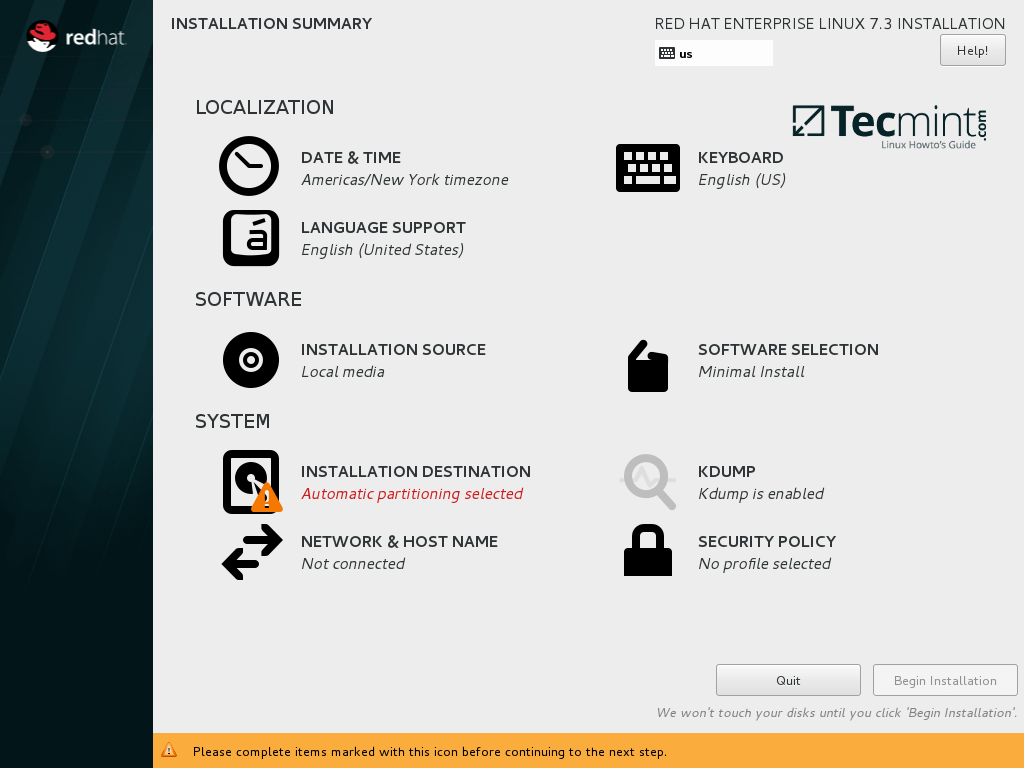][7]
|
||
|
||
*RHEL 7.3 安装概览*
|
||
|
||
[][8]
|
||
|
||
*选择 RHEL 7.3 日期和时间*
|
||
|
||
4、 接下来,就是配置你的键盘(keyboard)布局并再次点击完成 (Done) 按钮返回安装主菜单。
|
||
|
||
[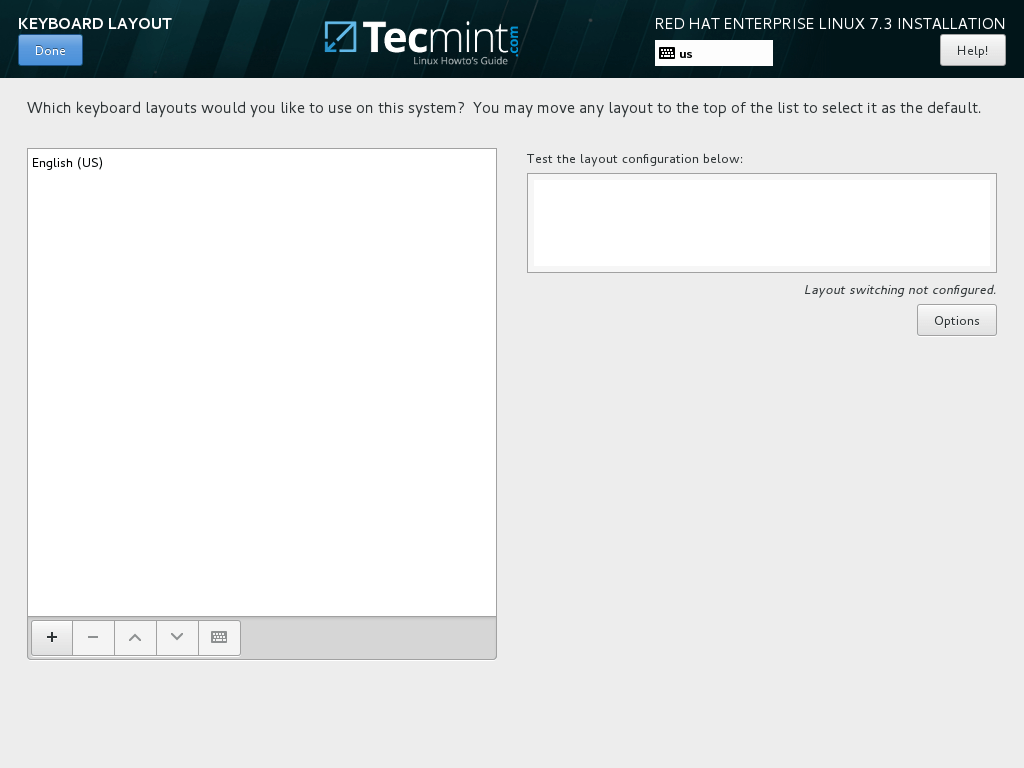][9]
|
||
|
||
*配置键盘布局*
|
||
|
||
5、 紧接着,选择你使用的语言支持(language support),并点击完成 (Done),然后进行下一步。
|
||
|
||
[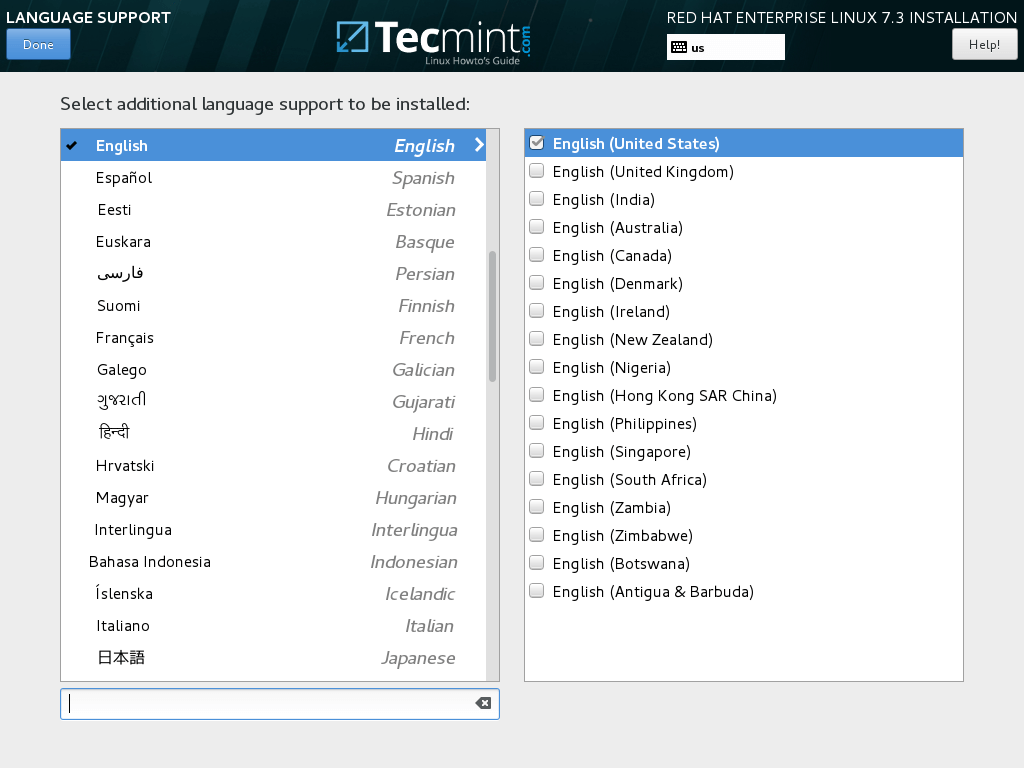][10]
|
||
|
||
*选择语言支持*
|
||
|
||
6、 安装源(Installation Source)保持默认就好,因为本例中我们使用本地安装 (DVD/USB 镜像),然后选择要安装的软件集(Software Selection)。
|
||
|
||
此处你可以选择基本环境 (base environment) 和附件 (Add-ons) 。由于 RHEL 常用作 Linux 服务器,最小化安装(Minimal Installation)对于系统管理员来说则是最佳选择。
|
||
|
||
对于生产环境来说,这也是官方极力推荐的安装方式,因为我们只需要在 OS 中安装极少量软件就好了。
|
||
|
||
这也意味着高安全性、可伸缩性以及占用极少的磁盘空间。同时,通过购买订阅 (subscription) 或使用 DVD 镜像源,这里列出的的其它环境和附件都是可以在命令行中很容易地安装。
|
||
|
||
[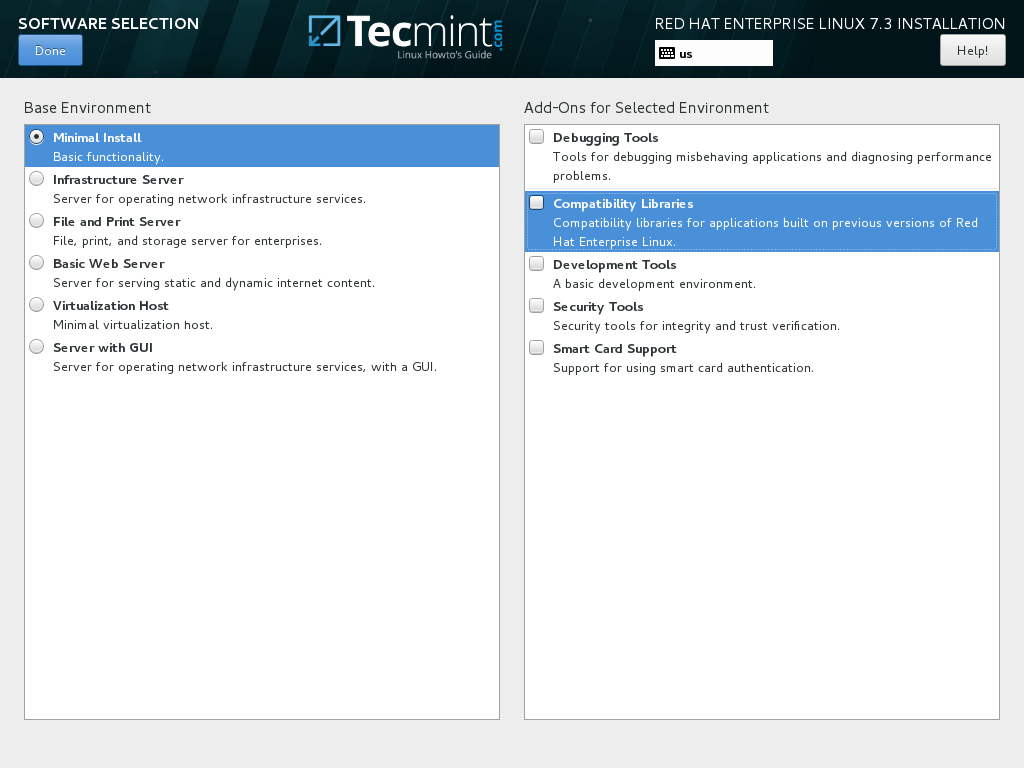][11]
|
||
|
||
*RHEL 7.3 软件集选择*
|
||
|
||
7、 万一你想要安装预定义的基本环境之一,比方说 Web 服务器、文件 & 打印服务器、架构服务器、虚拟化主机、带 GUI 的服务器等,直接点击选择它们,然后在右边的框选择附件,最后点击完成 (Done) 结束这一步操作即可。
|
||
|
||
[][12]
|
||
|
||
*选择带 GUI 的服务器*
|
||
|
||
8、 在接下来点击安装目标 (Installation Destination),这个步骤要求你为将要安装的系统进行分区、格式化文件系统并设置挂载点。
|
||
|
||
最安全的做法就是让安装器自动配置硬盘分区,这样会创建 Linux 系统所有需要用到的基本分区 (在 LVM 中创建 `/boot`、`/boot/efi`、`/(root)` 以及 `swap` 等分区),并格式化为 RHEL 7.3 默认的 XFS 文件系统。
|
||
|
||
请记住:如果安装过程是从 UEFI 固件中启动的,那么硬盘的分区表则是 GPT 分区方案。否则,如果你以 CSM 或传统 BIOS 来启动,硬盘的分区表则使用老旧的 MBR 分区方案。
|
||
|
||
假如不喜欢自动分区,你也可以选择配置你的硬盘分区表,手动创建自己需要的分区。
|
||
|
||
不论如何,本文推荐你选择自动配置分区。最后点击完成 (Done) 继续下一步。
|
||
|
||
[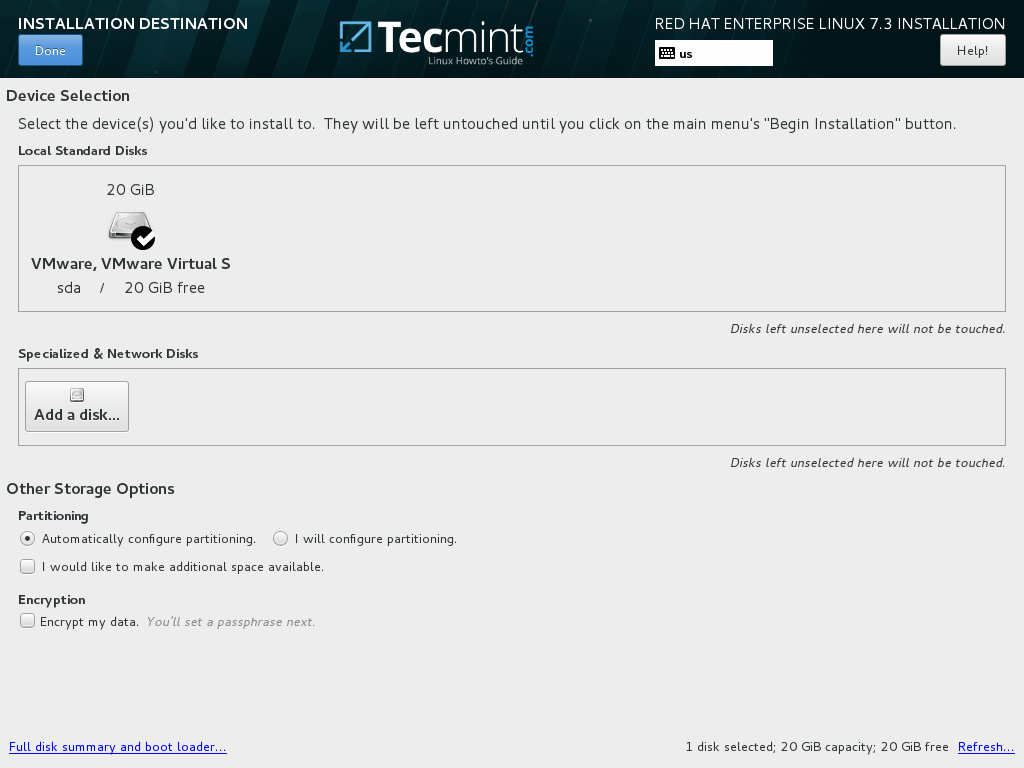][13]
|
||
|
||
*选择 RHEL 7.3 的安装硬盘*
|
||
|
||
9、 下一步是禁用 Kdump 服务,然后配置网络。
|
||
|
||
[][14]
|
||
|
||
*禁用 Kdump 特性*
|
||
|
||
10、 在网络和主机名(Network and Hostname)中,设置你机器使用的主机名和一个描述性名称,同时拖动 Ethernet 开关按钮到 `ON` 来启用网络功能。
|
||
|
||
如果你在自己的网络中有一个 DHCP 服务器,那么网络 IP 设置会自动获取和使用。
|
||
|
||
[][15]
|
||
|
||
*配置网络主机名称*
|
||
|
||
11、 如果要为网络接口设置静态 IP,点击配置 (Configure) 按钮,然后手动设置 IP,如下方截图所示。
|
||
|
||
设置好网络接口的 IP 地址之后,点击保存 (Save) 按钮,最后切换一下网络接口的 `OFF` 和 `ON` 状态已应用刚刚设置的静态 IP。
|
||
|
||
最后,点击完成 (Done) 按钮返回到安装设置主界面。
|
||
|
||
[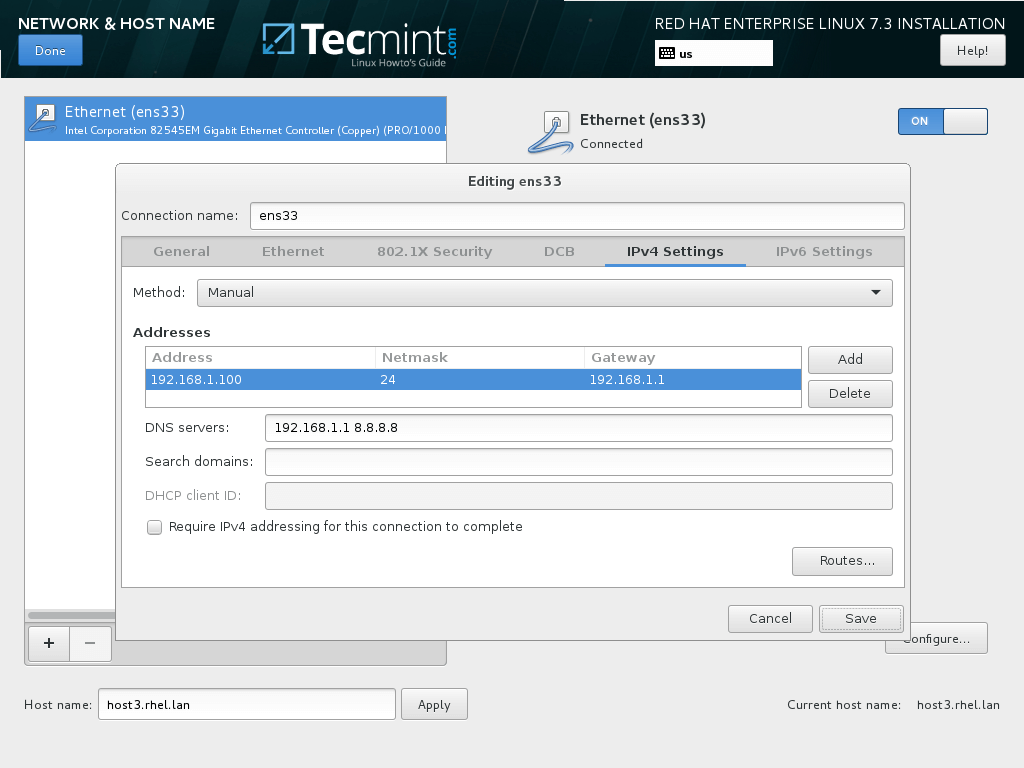][16]
|
||
|
||
*配置网络 IP 地址*
|
||
|
||
12、 最后,在安装配置主界面需要你配置的最后一项就是安全策略配置(Security Policy)文件了。选择并应用默认的(Default)安全策略,然后点击完成 (Done) 返回主界面。
|
||
|
||
回顾所有的安装设置项并点击开始安装 (Begin Installation) 按钮来启动安装过程,这个过程启动之后,你就没有办法停止它了。
|
||
|
||
[][17]
|
||
|
||
*为 RHEL 7.3 启用安全策略*
|
||
|
||
[][18]
|
||
|
||
*开始安装 RHEL 7.3*
|
||
|
||
13、 在安装过程中,你的显示器会出现用户设置 (User Settings)。首先点击 Root 密码 (Root Password) 为 root 账户设置一个高强度密码。
|
||
|
||
[][19]
|
||
|
||
*配置用户选项*
|
||
|
||
[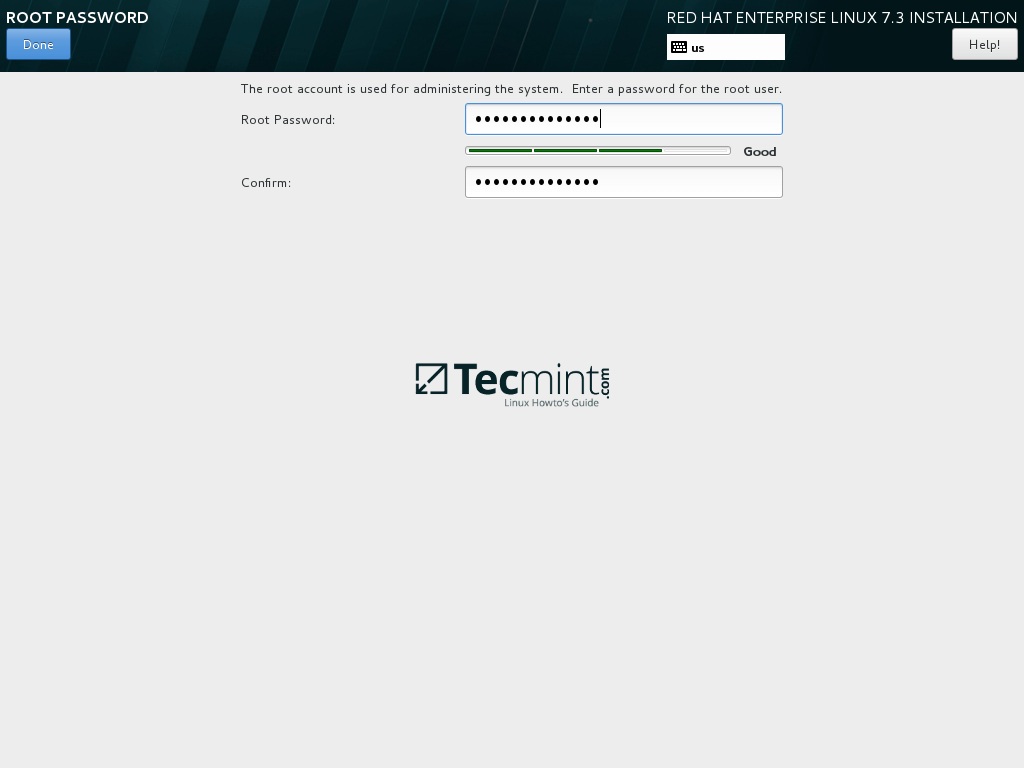][20]
|
||
|
||
*设置 Root 账户密码*
|
||
|
||
14、 最后,创建一个新用户,通过选中使该用户成为管理员 (Make this user administrator) 为新建的用户授权 root 权限。同时还要为这个账户设置一个高强度密码,点击完成 (Done) 返回用户设置菜单,就可以等待安装过程完成了。
|
||
|
||
[][21]
|
||
|
||
*创建新用户账户*
|
||
|
||
[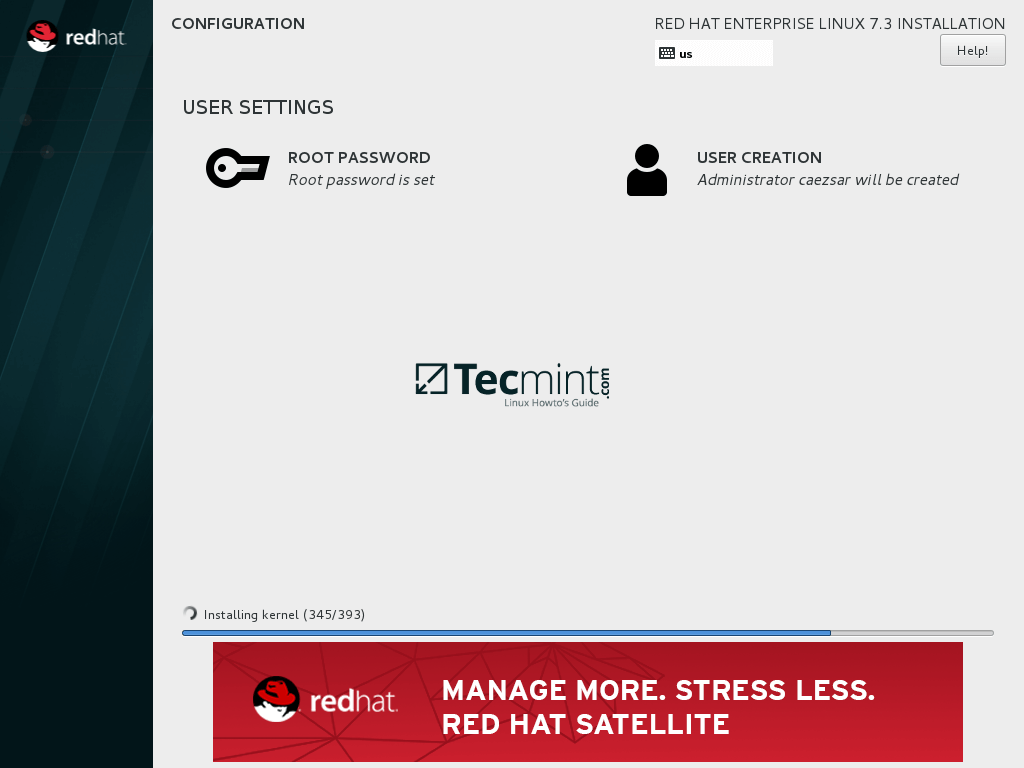][22]
|
||
|
||
*RHEL 7.3 安装过程*
|
||
|
||
15、 安装过程结束并成功安装后,弹出或拔掉 DVD/USB 设备,重启机器。
|
||
|
||
[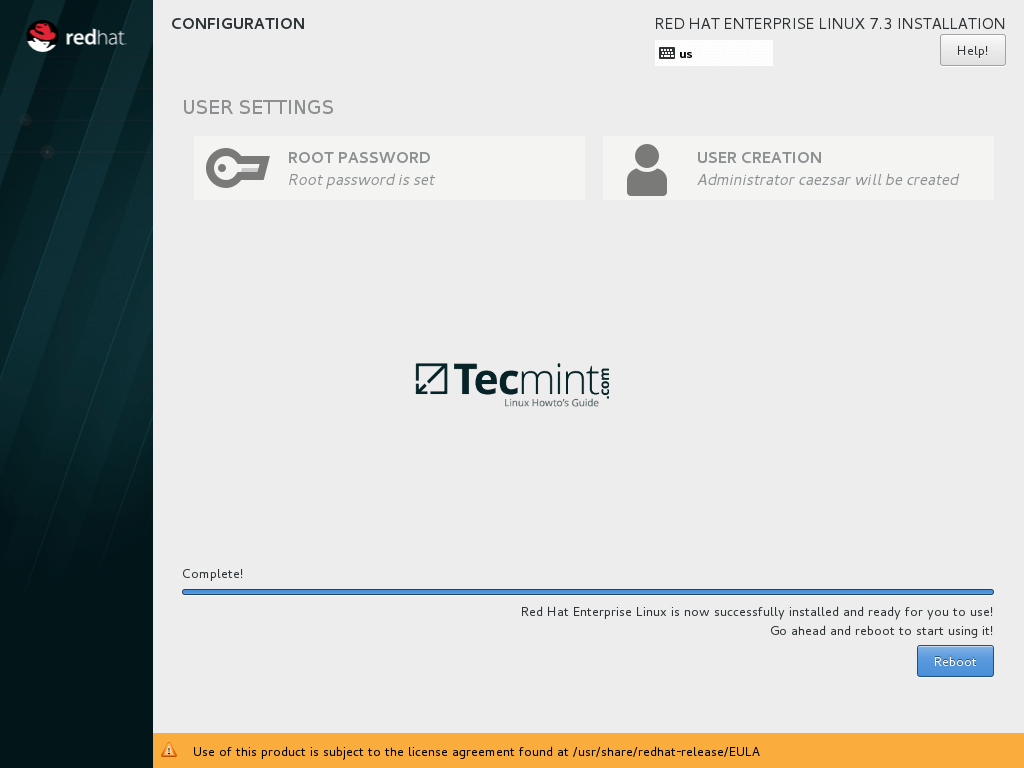][23]
|
||
|
||
*RHEL 7.3 安装完成*
|
||
|
||
[][24]
|
||
|
||
*启动 RHEL 7.3*
|
||
|
||
至此,安装完成。为了后期一直使用 RHEL,你需要从 Red Hat 消费者门户购买一个订阅,然后在命令行 [使用订阅管理器来注册你的 RHEL 系统][25]。
|
||
|
||
------------------
|
||
|
||
作者简介:
|
||
|
||
Matei Cezar
|
||
|
||

|
||
|
||
我是一个终日沉溺于电脑的家伙,对开源的 Linux 软件非常着迷,有着 4 年 Linux 桌面发行版、服务器和 bash 编程经验。
|
||
|
||
---------------------------------------------------------------------
|
||
|
||
via: http://www.tecmint.com/red-hat-enterprise-linux-7-3-installation-guide/
|
||
|
||
作者:[Matei Cezar][a]
|
||
译者:[GHLandy](https://github.com/GHLandy)
|
||
校对:[wxy](https://github.com/wxy)
|
||
|
||
本文由 [LCTT](https://github.com/LCTT/TranslateProject) 原创编译,[Linux中国](https://linux.cn/) 荣誉推出
|
||
|
||
[a]:http://www.tecmint.com/author/cezarmatei/
|
||
[1]:https://access.redhat.com/downloads
|
||
[2]:https://linux.cn/article-8048-1.html
|
||
[3]:https://access.redhat.com/documentation/en-US/Red_Hat_Enterprise_Linux/7-Beta/html/7.3_Release_Notes/chap-Red_Hat_Enterprise_Linux-7.3_Release_Notes-Overview.html
|
||
[4]:https://rufus.akeo.ie/
|
||
[5]:http://www.tecmint.com/wp-content/uploads/2016/12/RHEL-7.3-Boot-Menu.jpg
|
||
[6]:http://www.tecmint.com/wp-content/uploads/2016/12/Select-RHEL-7.3-Language.png
|
||
[7]:http://www.tecmint.com/wp-content/uploads/2016/12/RHEL-7.3-Installation-Summary.png
|
||
[8]:http://www.tecmint.com/wp-content/uploads/2016/12/Select-RHEL-7.3-Date-and-Time.png
|
||
[9]:http://www.tecmint.com/wp-content/uploads/2016/12/Configure-Keyboard-Layout.png
|
||
[10]:http://www.tecmint.com/wp-content/uploads/2016/12/Choose-Language-Support.png
|
||
[11]:http://www.tecmint.com/wp-content/uploads/2016/12/RHEL-7.3-Software-Selection.png
|
||
[12]:http://www.tecmint.com/wp-content/uploads/2016/12/Select-Server-with-GUI-on-RHEL-7.3.png
|
||
[13]:http://www.tecmint.com/wp-content/uploads/2016/12/Choose-RHEL-7.3-Installation-Drive.png
|
||
[14]:http://www.tecmint.com/wp-content/uploads/2016/12/Disable-Kdump-Feature.png
|
||
[15]:http://www.tecmint.com/wp-content/uploads/2016/12/Configure-Network-Hostname.png
|
||
[16]:http://www.tecmint.com/wp-content/uploads/2016/12/Configure-Network-IP-Address.png
|
||
[17]:http://www.tecmint.com/wp-content/uploads/2016/12/Apply-Security-Policy-on-RHEL-7.3.png
|
||
[18]:http://www.tecmint.com/wp-content/uploads/2016/12/Begin-RHEL-7.3-Installation.png
|
||
[19]:http://www.tecmint.com/wp-content/uploads/2016/12/Configure-User-Settings.png
|
||
[20]:http://www.tecmint.com/wp-content/uploads/2016/12/Set-Root-Account-Password.png
|
||
[21]:http://www.tecmint.com/wp-content/uploads/2016/12/Create-New-User-Account.png
|
||
[22]:http://www.tecmint.com/wp-content/uploads/2016/12/RHEL-7.3-Installation-Process.png
|
||
[23]:http://www.tecmint.com/wp-content/uploads/2016/12/RHEL-7.3-Installation-Complete.png
|
||
[24]:http://www.tecmint.com/wp-content/uploads/2016/12/RHEL-7.3-Booting.png
|
||
[25]:http://www.tecmint.com/enable-redhat-subscription-reposiories-and-updates-for-rhel-7/
|